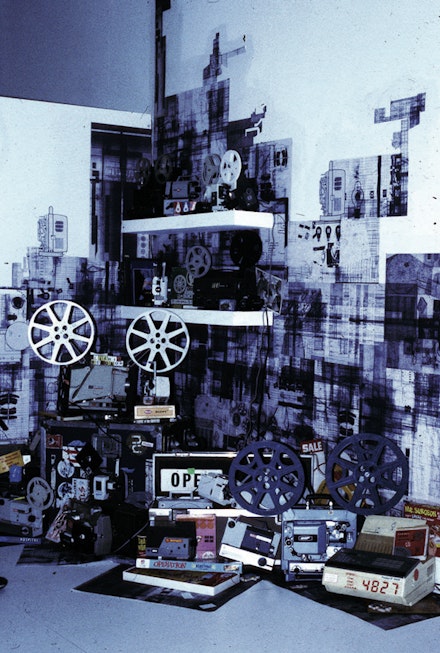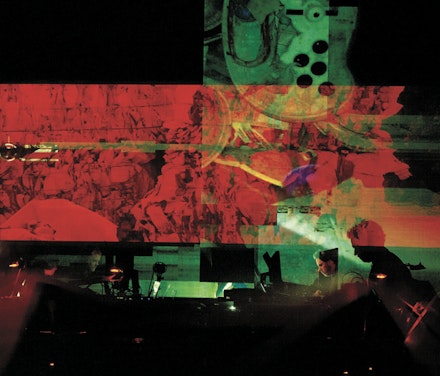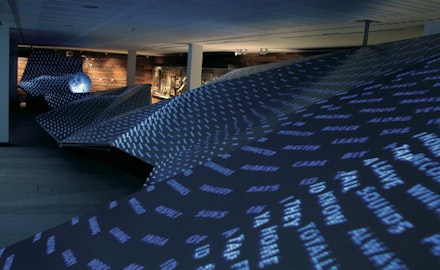Christopher Thomas Allen is a media artist and filmmaker from London. He established The Light Surgeons with a group of like-minded friends while studying Media Design at Portsmouth University in 1994. His work has always crossed a diverse range of different media; from his background in graphic design and photography, he has gone on to direct and produce award-winning short films, music videos, and motion graphics work. He works on all aspects of projects at The Light Surgeons as a producer, director, and collaborating multimedia artist in his own right. He has been central in the creation of countless large-scale installation projects, curated exhibitions, and helped to pioneer a whole new approach to multimedia performance art through The Light Surgeons live cinema projects.
What new or old tools are you
attached to in your art practice?
I have always been influenced by my tools and different processes in my work, particularly when there’s a happy accident to be created. I became fascinated with light and projection at a very early age, having a father who was a photographer and being exposed to the wonder of home cine films by my mother. I loved the way the tool of projection could transport me, how images could be instantly magnified and applied to any surface or environment. It was magic to me and remains something I love.


My brother began to DJ and make hip-hop in the ’80s so I was influenced by his collection of music. I wanted to explore this collage of samples and reflect the music’s compositions through my art and design. I began to collect old cine projectors, 8mm films and 35mm slide projectors. They were cheap and secondhand and had a very analog feel to them, which I loved. They reflected the ’70s for me and the dust warmth of the soul music that was being appropriated in the music I loved.
My practice was somewhere between graphic design and art. I was always busy making screen prints or messing around with photocopiers, so using projectors was an obvious development for my work, a fast and quick way to apply an image. My experiments with slides and film led to me creating these graphic light shows in night clubs in the early ’90s. Developing these shows led me to collaborate with other designers and artists and eventually to found my studio, The Light Surgeons, in East London in 1995.
As a studio our work has always utilized a wide range of different tools and approaches. The advent of digital cameras and the firewire connection that ushered in the era of desktop video was a major milestone. The sudden freedom to film and edit your own material at a relatively low cost, alongside a more open and accessible music production software, led us to make various experimental documentary film work and helped to give rise to our live cinema work.
We used all manner of analog video mixers, VHS players, live camera feeds, and digital outputs alongside the old 16mm film loops and slides. For us, the medium and its form were part of our message, we were all about the D.I.Y. aspect of our work and wanted to demystify things. The equipment became part of our stage design, for us it was an extension of the audio-visual collages we made and we lit it to create shadows and to expose it. For us it was a sort of sculpture of new and old media. This fascination with our obsolete, secondhand tools was the foundation of our first gallery work for the exhibition Stealing Beauty at the ICA in 1999.
Since then, as a studio, we have moved on to mainly using digital tools for most of our creative projects—from Adobe’s Creative Suite and Final Cut Pro to platforms like VDMX for our live performance work with real-time video. We have also begun to forge our own tools through collaborations with software developers, which offer unlimited possibilities and the potential to apply our work to new areas.
What tools have you rejected?
I have always tried to avoid tools that get in the way of my message or serve little purpose other than creating a dressing or purely aesthetic result. Of course, there are also plenty of tools that are just badly designed or built that are best avoided.

In terms of processes, a good example of this might be tools or plug-ins that create an “effect.” In my opinion there are far too many options with digital tools and the temptation is to make something look interesting or perhaps “cool” by using various effects. These are the tools I dislike as they rarely add any meaning or depth to the work.
I think the limitations of a tool can be more liberating and more creative than having all of the options to play with. I think it’s also true that as tools become obsolete, they become liberated and able to be used in different or unexpected ways. It’s interesting that many musicians are returning to more classical instruments or using more analog electronics. Perhaps these older tools represent a more authentic sound? Or maybe it’s just too easy to create work digitally these days and they have become the new edge.
I think it’s important to use the tools that enable your ideas and not to make ideas that enable the tools. I think there is a lot of technologically-driven media art these days that has little in the way of a concept or meaning behind it. Many pieces of work seem to exist because the artist felt the need to do something new with a new bit of emerging technology. I know it’s about fashion and certainly syntax, an inevitable reaction to a world increasingly submerged in technology, but I still think an idea and a message need to come first. I have found this becomes particularly evident when using custom software or code to develop an artwork. You really have to define what it is you want to do and sketch it out in order to build the right tool for the job.
What have the tools done to your art?
Tools, materials, and processes have always had a direct relationship to art, probably ever since we as human beings have expressed ourselves in a non-verbal way. It’s about craft for me, the mastering of your tools to express or forge the message or emotion that you seek to project. However much the form of these tools might change, I think you can still be a great craftsman. I think we would do well to remember this.
Both analog and digital tools have been a central aspect to my craft, they have allowed me to discover my art, to discover myself, to connect with people and learn about the world. They are something I have lived with and learned to love. They have given me the means to express myself in ways that previous generations could only have dreamed of. My only wish is that I could spend less time looking at a screen as I’m sure that this has a very negative effect on our health.